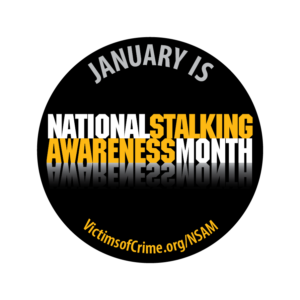Awareness is power; in many situations making the difference between getting home safely or becoming a victim. We’ve all heard the warnings:
Be aware of your surroundings.
If you see something say something.
With this is mind, Stalking Awareness Month was created 15 years ago by the National Center for Victims of Crime to shed light on a very difficult and dangerous situation that over 7 million people unwittingly find themselves in each year. Stalking affects both men and women, predominantly targeting young adults ages 18-39. A majority of victims claim to know their stalkers, many being a former spouse, date, or partner. This year I believe Stalking Awareness Month comes at a particularly opportune time in light of the increased ease technology offers potential stalkers to reach and terrorize their victims
What is stalking?
In New Jersey stalking is defined as:
“Purposeful conduct directed at a specific person that would cause a reasonable person to fear bodily injury or death to himself or family member and knowingly, recklessly, or negligently places a person in reasonable fear of bodily injury or death to himself or family member.” New Jersey Stalking Law 2C:12-10
Stalking is a crime in the 4th degree, and a crime in the 3rd degree if it is a repeat offense; both punishable by fines and by jail time. Intent is the key in the crime of stalking. If there is no intent to cause harm or fear there is no stalking. Who determines intent? As Judge Potter Stewart famously said in 1964 (originally in reference to pornography) and repeated by judges in reference to intent, I know it when I see it.
What stalking is not. If asked, most people would be able to describe stalking in broad terms. However, I have found that today some behaviors are wrongly called stalking. For example, surveillance is not stalking. In my line of work we are well aware of the stalking laws. If we break them while on surveillance we risk our findings to become inadmissible as evidence and negatively affect our client’s case. As discussed, stalking must have an intent to cause emotional or physical fear to its subject or family. As private investigators we work to keep our subject unaware of our presence. If they do not know we are there then it clearly follows they will have no reason to fear. We are often asked if when we are watching people we are, in fact stalking them. The answer is always No.
Cyberstalking is a modern form of stalking. Cyberstalking, or cyberharassment has the same definition as physical stalking but it is done online through various channels. Stalkers make contact through social media, harassing victims and then make direct or veiled threats. Cyberharassment does NOT cover daily scrolling through social media where we watch friends, family, and even our kids. Even when we are watching someone carefully online for sign of ill behavior such as kids drinking, drug use, or even signs of infidelity unless they are aware of our presence, fear us, and there is an intent to instill this fear, it is not stalking. We have become very comfortable with saying “I’m stalking my teens on social media”. Lack of fear and intent is what protects these “urban stalkers” from breaking any laws.
As with physical stalking, proving intent and drawing the line between where communicating through social media becomes cyber harassment can be difficult. Intent to harass or harm, or actual harm, must have occurred or the cyber stalkers activities may be protected under the First Amendment. While this may seem unfair it protects all the ignorant social media users who say and send questionable messages and pictures with no malicious intent.
Am I Being Stalked?
Look for these signs:
- Contact, whether phone calls, text messages, in-person, emails, etc… persist despite being asked to stop all contact
- Suspected stalker waiting and/or making contact at place of work, residence, school, etc.
- Talking or lying about you to others
- Overt threats either in person or online
- Manipulative behavior forcing contact (ex: threatening suicide if you don’t respond)
- Sending on-going written messages via letters, emails, notes left in various places to be “found”
If any or all of these behaviors cause you to fear for your, or your family’s, safety there are steps you can take. The National Center for Victims of Crime recommends these steps:
What To Do If You Are Being Stalked
- Trust your instincts. Victims of stalking often feel pressured by friends or family to downplay the stalker’s behavior, but stalking poses a real threat of harm. Your safety is paramount.
- Call the police if you feel you are in any immediate danger. Explain why even some actions that seem harmless—like leaving you a gift—are causing you fear.
- Keep a record or log of each contact with the stalker. Be sure to also document any police reports.
- Stalkers often use technology to contact their victims. Save all emails, text messages, photos, and postings on social networking sites as evidence of the stalking behavior.
- Get connected with a local victim advocate to talk through your options and discuss safety planning. Call the National Domestic Violence Hotline at 1–800–799–SAFE.










